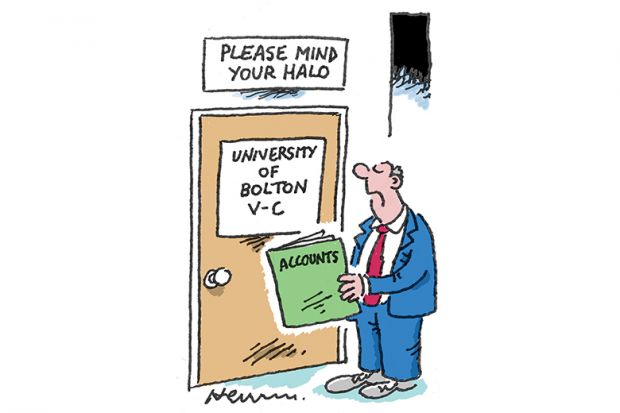
Previous outcries over vice-chancellors’ pay mean financial accounts in England now have to include a statement justifying leaders’ remuneration. However, most statements are unlikely to match the superlatives showered on University of Bolton vice-chancellor George Holmes – a leader who has attracted media attention in the past over his salary and love of luxury cars – to justify his £322,000 pay package in 2019-20. Running to almost two-and-a-half pages, the text talks of the “truly extraordinary and rapid progress” made by Bolton into a “successful university, which has brought so much to its students and to the town”. It goes on to praise the university’s “sector leading” response to the pandemic and how Professor Holmes and his team had “worked tirelessly” in the aftermath of a major fire at a privately run student accommodation block last year. His leadership had been tested “as never before”, says the statement, but he had “passed that test with skill, flexibility and real authority”. With a flourish, it adds: “The coming year may present even greater challenge; it was hard, however, to imagine anyone better to meet that, if it was to be so, than the present president and vice-chancellor.”
Many a scientist has probably imagined their reaction to winning a Nobel prize. But the suddenness of the news has clearly caught a few academics off guard, according to a new book based on conversations with 24 Nobel laureates. Among the details to emerge in Nobel Life are Richard Ernst (chemistry, 1991) being woken up while sleeping on a plane before being ushered into the cockpit to speak to the Nobel committee over the radio. Roger Tsien (chemistry, 2008) was so sure he hadn’t won that he took a sleeping pill but then had to give a press conference in the middle of the night. Kary Mullis (chemistry, 1993) was warned people would be phoning him all day – and so went surfing. The book, which also delves into the human sacrifices and choices that make a Nobel winner, is by Stefano Sandrone, a neuroscientist based at Imperial College London.
Bad behaviour on campus, at least in the UK, usually amounts to students placing traffic cones in inaccessible places after a few too many light beverages. But in Taiwan it is the more mature visitors to university grounds that you have to be wary of. It comes after reports of misdemeanours including illegal parking, trespassing, and perhaps most alarmingly, theft of university turtles, by visitors to an exhibition at the Taipei National University of the Arts. According to the Taipei Times, students and academics had reported that some visitors to the exhibition had “absconded with turtles from the university’s ecological pool, while others picked berries from the university’s mulberry trees”. There were also instances of “visiting parents using public works of art as playground equipment”, the article said, adding that the university was reserving the right to take people to court over any damage.
An academic article that presented data suggesting current smokers could be less likely to be diagnosed with Covid than non-smokers has been retracted after a journal said it had found out that some authors had undeclared financial links to the tobacco industry. The European Respiratory Journal said in a retraction notice that two authors “had failed to disclose potential conflicts of interest at the time of the manuscript’s submission”, The Guardian reported. The notice added that one of the authors, José Mier, “at the time had a current and ongoing role in providing consultancy to the tobacco industry on tobacco harm reduction” while another, Konstantinos Poulas, had been a principal investigator for a Greek non-governmental organisation with funding links to the tobacco industry. However, the paper’s senior author, Konstantinos Farsalinos, told Retraction Watch that the conflicts of interest “were irrelevant to the study’s main aims and objectives” and that he thought the decision was “unfair and unsubstantiated”.
Sir Isaac Newton has become the latest historical figure to be at the centre of a decolonisation row. According to The Sunday Telegraph, the University of Sheffield’s engineering faculty has drafted a decolonisation plan highlighting that Newton was a potential beneficiary of “colonial-era activity”. Although it does not mention the exact reasons, it is thought to relate to Newton’s investment in the South Sea Company, which traded in slaves. Critics lined up in the article to say the example showed how the decolonisation drive could get out of hand. Sheffield said that it was “committed to upholding freedom of speech” and was ensuring “historically marginalised or suppressed knowledge” was available to students.
Register to continue
Why register?
- Registration is free and only takes a moment
- Once registered, you can read 3 articles a month
- Sign up for our newsletter
Subscribe
Or subscribe for unlimited access to:
- Unlimited access to news, views, insights & reviews
- Digital editions
- Digital access to THE’s university and college rankings analysis
Already registered or a current subscriber? Login



